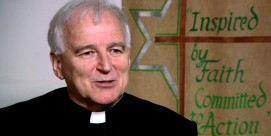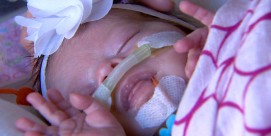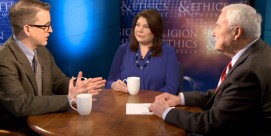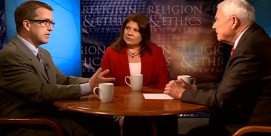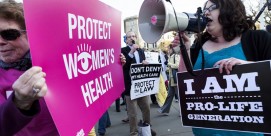In This Episode << SLIDE LEFT TO SEE ADDITIONAL SEGMENTS
Mark Rozell Extended Interview
Read the full R & E interview about Catholic voters with Mark Rozell, professor of public policy at George Mason University:
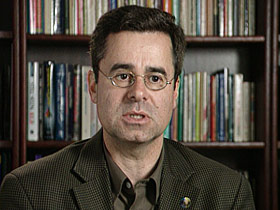
Catholic voters are hugely important because we’re talking about one quarter of the electorate in the United States. But I think there is this misnomer floating around out there about THE Catholic vote, as though this were a unified bloc of voters waiting to be mobilized by one candidate or the other. What we have really is a largely diverse body of voters that is really not terribly distinctive when you look at the voting patterns of Americans more generally. We really have to look at distinctions within the Catholic community to find where the different blocs of voters are rather than talk in general about a “Catholic vote.”
Catholics used to be a part of the old New Deal Democratic Party coalition. They really helped anchor the Democratic Party for a number of generations, and the old Catholic monolith was really based mostly around ethnicity, around economic issues. We’re talking about a group of people who were of the immigrant underclass, who moved into the central cities and joined labor unions and became Democratic Party identifiers. It was that simple. But around the 1970s, there started to be a split within the Catholic community in part because of the national Democratic Party’s support for abortion rights. George McGovern’s campaign in 1972 highlighted that issue, the ROE decision, of course, in 1973. We started to see a number of Catholics looking at social issues as opposed to just economic issues in their voting patterns. And Republicans, of course, started to embrace the so-called pro-life movement when the modern Christian Right was formed in the later 1970s, so we saw a lot of socially conservative Catholics breaking away from their traditional support from the Democratic Party and either becoming Republicans or becoming independent voters who could be persuaded to vote Republican if there was a very strong difference between the Democratic candidate and the Republican candidate, specifically on abortion.
John Kerry is not running self-consciously as the Catholic candidate for the presidency. In my lifetime there was one other example, John Kennedy, and at that time, of course, many Americans asked whether a Catholic could be elected to the presidency, whether a Catholic politician would be taking his cues from the Vatican, and so forth, and of course Kennedy proved that Catholics are electable in American politics at the national level, and we really haven’t had that debate for the past four decades. But John Kerry, being the next major party candidate for the presidency who is Catholic, really hasn’t run a campaign where he has self-consciously identified himself as such or tried to wrap himself in that identity as a way of trying to mobilize Catholic voters in America, and I think for perfectly good reason. I think Kerry recognizes that there is not a distinctive monolithic bloc out there called “the Catholic vote,” so trying to wrap himself up in that identity I don’t think is going to buy him any votes in the end. It’s really going to be his issue positions that attract certain blocs of Catholic voters who might be more willing to vote for a Democrat than a Republican if those issues happen to appeal to them.
You could break up the Catholic community into a vast variety of blocs, in a sense. We could talk about ethnic blocs, for example, Hispanic Catholics who are hugely important in this election, who tend to be socially very conservative but for the most part still identify [as] Democrat[s] on the basis of economic and civil rights-oriented issues. Or we could break it up according to class distinctions, those who are still of the inner-city working-class Democratic Party-identifying group of voters, or those Catholics who, unlike their parents or grandparents, have moved out to the suburbs, gotten college degrees and law degrees, and achieved economic success and become Republicans. Or we could distinguish between socially conservative regular churchgoing Catholics and Catholic identifiers in the electorate who are not very religious. They’re not regular churchgoers, but when surveys are done of the U.S. voting population, for example, and they’re asked to self-identify on the religion question, they still say “Catholic.” I think the most important distinction politically is between the regular churchgoing Catholics and the occasional and nonchurchgoing Catholics. The former group is heavily Republican, and the latter group is strongly Democrat[ic].
If you want to single out a variable that can really tell you whether a Catholic voter is more likely to be a Democrat or a Republican, it is church attendance. Those who are regular attenders of Mass either daily or weekly, or several times a week — they’re very socially conservative, they’re attracted to the Republican Party, they’re more likely to vote for the Methodist George W. Bush than for the Catholic John Kerry because of issues such as abortion and school prayer and so forth. The nonchurchgoing or occasional churchgoing Catholics — they’re still very heavily Democrats. It’s very interesting to follow this in elections. Remember, for example, in 1996 after the Clinton veto of the so-called partial birth abortion bill, a lot of social conservatives were saying this is going to cause a massive mobilization of Catholic voters in favor of the Republicans in the ’96 election cycle; that was just too much for most Catholics. Over 60 percent of Catholics voted for Bill Clinton in 1996 despite that issue. So it’s not necessarily the social issues that are driving most Catholics, but among that minority of Catholics who go to church very often and are deeply religious, they’re heavily Republican; they’re the Bush voters right now.
The bishops, when they decide to speak out on political issues, don’t really affect the voting behavior of the vast majority of Catholics in America. The voters themselves tend to be extremely independent of the Church hierarchy at any time when the hierarchy gives some signal about voting preferences. That’s been a constant for American Catholics, I think, for a very long time. Even though, in this election cycle, some bishops have spoken out openly and questioned Kerry’s claim to be Catholic because of his policy views, I don’t see that moving any Catholic voters at all. The people who are inclined not to vote for Kerry because of his positions on social issues — they’re already going to vote Republican. They don’t need to be prodded by the bishops to go out and vote against a socially liberal candidate. And those Catholics who are inclined not to support some of the social issue positions of the Catholic Church — abortion, school prayer, and so forth — who are not motivated to follow the lead of the bishops, they’re Kerry supporters to begin with. I just don’t see this really affecting the voting outcome at all.
It’s important to point out that the scandals in the Church that have really come to light in the past several years and the way the Church leadership has dealt with these scandals has hurt the credibility of the Church hierarchy when the Church decides to speak out on political issues or to give political signals in a campaign … as some of the bishops have done in this campaign, suggesting John Kerry doesn’t have a rightful claim to call himself a Catholic, or Catholic voters should not support a man who has some of the policy positions he has. I just don’t see that affecting the votes of those particular Catholic voters, because the heavy churchgoers are going to be Republicans anyway, the non- or occasional churchgoers are more heavily Democrat[ic], and these two different sides are pretty much locked right now in this election, and they’re not moving.
A certain number of Catholic voters who are not strongly entrenched in one political party or the other may be offended by abortion rights, but they also may be offended by the war in Iraq, and so they have this internal conflict as to the trump issue in this election cycle. Where do they put their loyalty? Obviously they may be more attracted to Bush because of his position on abortion, but they may oppose him because of how he’s handled the war in Iraq. I haven’t really seen any polling data that bring this small group together and identify what their leanings are. I tend to think that that is a real swing voter population in the electorate right now. We’re not sure where they’re going to go on Election Day and which issues are really going to carry the day for them.
Current events are hugely important, particularly in this election cycle that we’ve all been saying is an events-driven election, because we have this war in Iraq, and we have uncertainty about the economy, and a number of issues out there that just seem to change the standing of the candidates relatively significantly when events happen. We still have some weeks left in this campaign. We have debates that are going to take place between the candidates, so there’s still a lot that could happen in the next several weeks that could change voters’ minds.
On the social or so-called moral issues, of course, the Church leadership is much closer to what is right now the Republican position than what is right now the Democratic position, so if the intent [of the Catholic bishops’ voter’s guide] is to try to persuade Catholic voters that one particular party or one presidential candidate is more friendly to the Church positions, then I think that can help get the word out a little bit. But I just have to believe that most of the socially conservative, regular churchgoing Catholics are already in the Republican column, as the data suggest. This extra inducement is not really going to make a dramatic difference in their decision whether to vote or who to vote for. I think they are already there; they’re already Bush voters at this point.
Some faithful Catholics who are strongly antiabortion tend to identify with Republicans, but they’re not comfortable with the war in Iraq. They feel that, perhaps, it was morally not the right thing to do as well. Then the question becomes, where do they go on Election Day? But from all the data that I’ve looked at, it really seems that the abortion issue for these socially conservative Catholics trumps all. It’s really the issue that’s driving their voting behavior right now, more than the war in Iraq. A number of Catholics are both antiabortion and also opposed to the war, but the abortion issue seems to be trumping their voting decisions right now. There are many others who fall in between, who are deeply conflicted because they don’t know which of those issues right now should really carry the day for them.
There are a number of Catholics who are independents, like most Americans. They don’t strongly identify, or they don’t tell survey researchers that they consider themselves Democrat or Republican. But the reality is, when you look at the voting patterns of these same people, they tend to either vote Democrat consistently or vote Republican consistently. Even though a lot of the data suggest right now that there are large numbers of independents among Catholic voters, most of them are actually still, in their voting patterns, identifying with one political party or the other. But as [former Boston mayor and ambassador to the Vatican] Ray Flynn points out, there are a number of Catholics who feel right now that neither political party perfectly represents their particular viewpoint. That’s true of all groups and American politics. You can point to any religious, ethnic-based group or interest group, social movement, and ask, “Which political party really stands for you?” and they’ll say, “You know, we really tend to be more Democrat or more Republican, but neither party’s really perfect.” That’s just the way it works in our system.
I think it’s been a mistake of many Democratic Party campaigns to do what Kerry is doing, and that is to say, “We don’t wear our religion on our sleeves; we’re not so open about it; we’re not comfortable talking about it in the public square.” Unfortunately for them, I think many Americans expect candidates to talk about values issues and ethics and morality, and for a number of years now I think the Republicans have, to some extent, had a monopoly on the whole values debate. We have this movement in American politics we call the Christian Right, which is very actively mobilizing at the grassroots, identifying its people and speaking openly about values issues. There are some polls out there right now that have been done that ask Americans, “What are the most important issues in these campaigns?” And values come to the very top, trumping the economy and the war in Iraq. I think it’s a mistake when Democratic candidates simply say, “Well, we’re not comfortable talking about values issues or religion in the public square.” Most Americans, even secular-oriented Americans, are concerned about cultural issues, concerned about values, concerned about what’s going on in the public schools and public morality and so forth, all the things that the Republicans and the religious Right are very comfortable talking about. And yet the Democrats are saying, “We’re just not so comfortable talking about these things.” I think they miss a big opportunity by saying that they’re really not so comfortable talking about the whole values debate in public.
It’s very different from 1960, say, when John Kennedy was running self-consciously as a Catholic and there was a lot of pride among Catholic voters about just breaking that barrier and having a Catholic elected as president. Many of those voters, I think, were willing to put aside, perhaps, some of their policy differences with Kennedy, even those who might have identified more closely with Republican issues. It was such an important matter, to get this breakthrough and have a Catholic elected president. But this is four and a half decades later, and it’s a different America right now. I don’t think that there’s a lot of value added for John Kerry to run a similar type message or to promote himself self-consciously as the Catholic candidate in this campaign, because the barrier has been broken. No one is saying anymore that a Catholic can’t be elected or that someone is possibly going to be disadvantaged in running for public office specifically because he’s a Catholic. I don’t think there’s a core constituency out there that feels a strong sense of pride in the Catholic identity of a presidential candidate and will vote for him specifically on that basis alone. The so-called Catholic voters are thoroughly homogenized in the American voting population right now. They look like the rest of America, in a sense — they’re Democrats, they’re Republicans, they’re independents, they’re in the cities, they’re in the suburbs. I just don’t see that there’s a lot of political value to be gained by Kerry running a self-conscious campaign: “I’m the Catholic, and I’m reaching out to you on the basis of our shared religious identity.”
The Bush campaign has done that and did its [Catholic] outreach in the 2000 election cycle. You can even find in a lot of Bush’s speeches during his presidency that he has slipped in phraseology that connects very deeply with religious Catholics but might fly under the radar of most other Americans who don’t understand the references that Bush was making. He’s done that very self-consciously, I think, to try to connect with regular, churchgoing, conservative Catholics, for the most part. When people talk about the Catholic outreach of the Bush administration or the Bush campaign, I think it’s a targeted outreach to a particular group of Catholics, and that is the so-called faithful Catholics or regular, churchgoing Catholics who are going to be sympathetic to Bush’s policy views.
In using some language that might appeal to Catholics or be understood by them, Bush may be able to forge some kind of connection to the Catholic community. He’s had advisors, both informally and within the administration, who have really helped him in trying to do more outreach to the Catholic community. It has been a part of his political strategy, there’s no doubt about that, and there’s certainly more of that coming from the Bush campaign side than there is from the Kerry campaign side, even though Kerry’s the Catholic in this race. I’ve read articles by influential conservative Catholic writers who say, “I’m voting for the Methodist, and I’m doing so because I feel a deeper bond with George Bush because he understands us better” — talking about faithful Catholics — “than this guy John Kerry, who’s got it all wrong on the social issues.” It’s been a successful strategy on Bush’s part to forge a comfortable relationship with churchgoing Catholics, despite the fact that he himself is not Catholic. He’s a Methodist.
The Hispanic vote in America still is more strongly Democrat[ic], without a doubt. There are some differences, of course. In southern Florida, the Cuban Americans who are intensely anticommunist, anti-Castro, [are] of course very grateful for U.S. policy there and tend to be more Republican-leaning. But on civil rights issues of immigration and so forth, Hispanic Americans tend to be a lot closer to the Democratic Party than the Republican Party, and I think Hispanic Catholics are a key voting group right now in the electorate that both parties are reaching out to. It’s an interesting voting group from the standpoint that if you look at the survey data, Hispanic Catholics tend to be socially quite conservative. They tend to be very religious, antiabortion, not terribly in favor of gay rights, for example. For a lot of the social wedge issues, they can be motivated to think a little bit about the Republican Party. They tend to be pretty conservative on cultural and social issues. But on the core issues on which most Hispanics base their voting — economic issues, immigration, education — they’re much more comfortable in the Democratic Party, and those issues tend to trump the social and cultural issues right now.
There has been a real movement by Protestant groups to reach out to new Hispanic immigrants. The Pentecostal church particularly has been hugely effective in drawing in a lot of new South American immigrants, Hispanics who come to a new country and they’re looking for a community and an identity with which they can forge some kind of identification and sense of belonging, and the outreach really has been done so much more by the Protestant churches than by the Catholic churches, which is quite surprising. That seems to be where a lot of the energy is. The studies that I have seen have shown that the Protestant churches have made pretty significant inroads in reaching out to new Hispanic immigrants in the United States. That could have political implications for the future if many of these more conservative-leaning Protestant denominations are bringing in large numbers of Hispanic immigrants and inviting them into their churches and persuading them to change from their Catholic affiliation to a Protestant denomination. It could be very interesting in the future to see how that develops. It could change somewhat the makeup of Hispanic voter identification in this country.
The Hispanic community is the fastest-growing ethic community in America right now. It’s hugely important. It’s interesting that the Republicans, up until about the mid- to late 1990s, were on the bandwagon with anti-immigration — Proposition 209 in California, where they were trying to limit government provision of goods and services to illegal immigrants, and so forth. They’ve dropped that completely, because they have seen how hugely unpopular that was in the Hispanic community and how over time that was just political suicide for the future of the Republican Party. President Bush, a Republican and conservative, is really supporting the so-called pro-immigration policies that Hispanics favor and trying to do outreach to the Hispanic community on that basis. There’s pretty much a consensus between the parties right now, whereas 10 years ago there was a huge divide between the parties on immigration issues. I think that shows the huge and growing power of the Hispanic vote in this country, and it’s only going to get bigger.
Hispanics in America again are more comfortable with the Democratic Party on issues of immigration and economic issues in particular, but on social-cultural issues, many are very conservative. They are deeply religious, and so it’s important that Kerry reach out to Hispanic voters — most Hispanics are Catholic in America — emphasizing the importance of faith in his life, because that’s an issue that resonates with many Hispanic voters who might be persuaded to consider the Republican Party on social-cultural issues if the Democrats simply did not bring those issues into the debate in this campaign at all.

